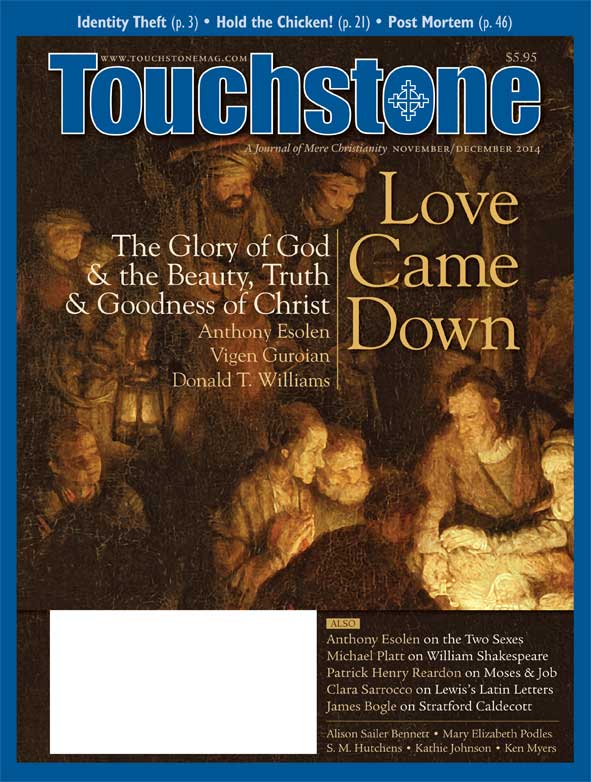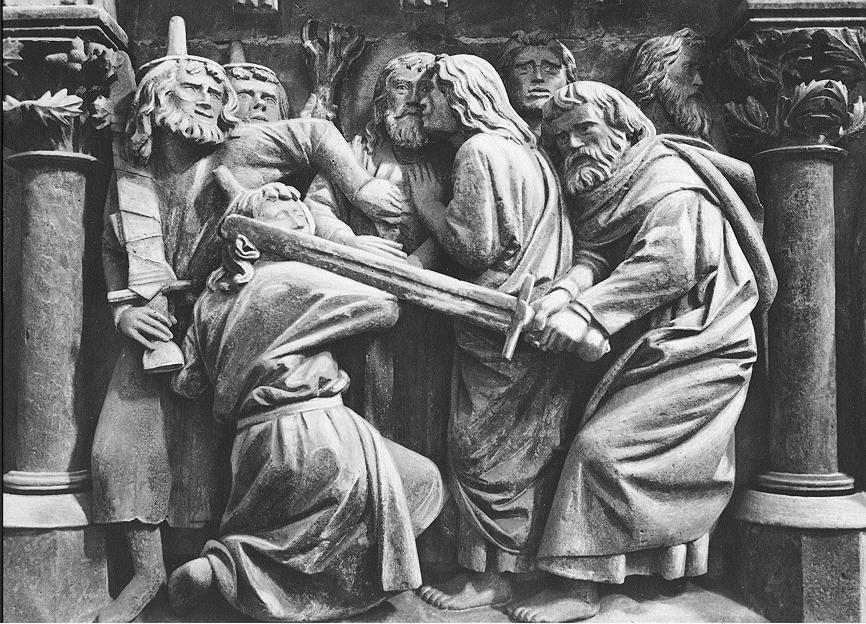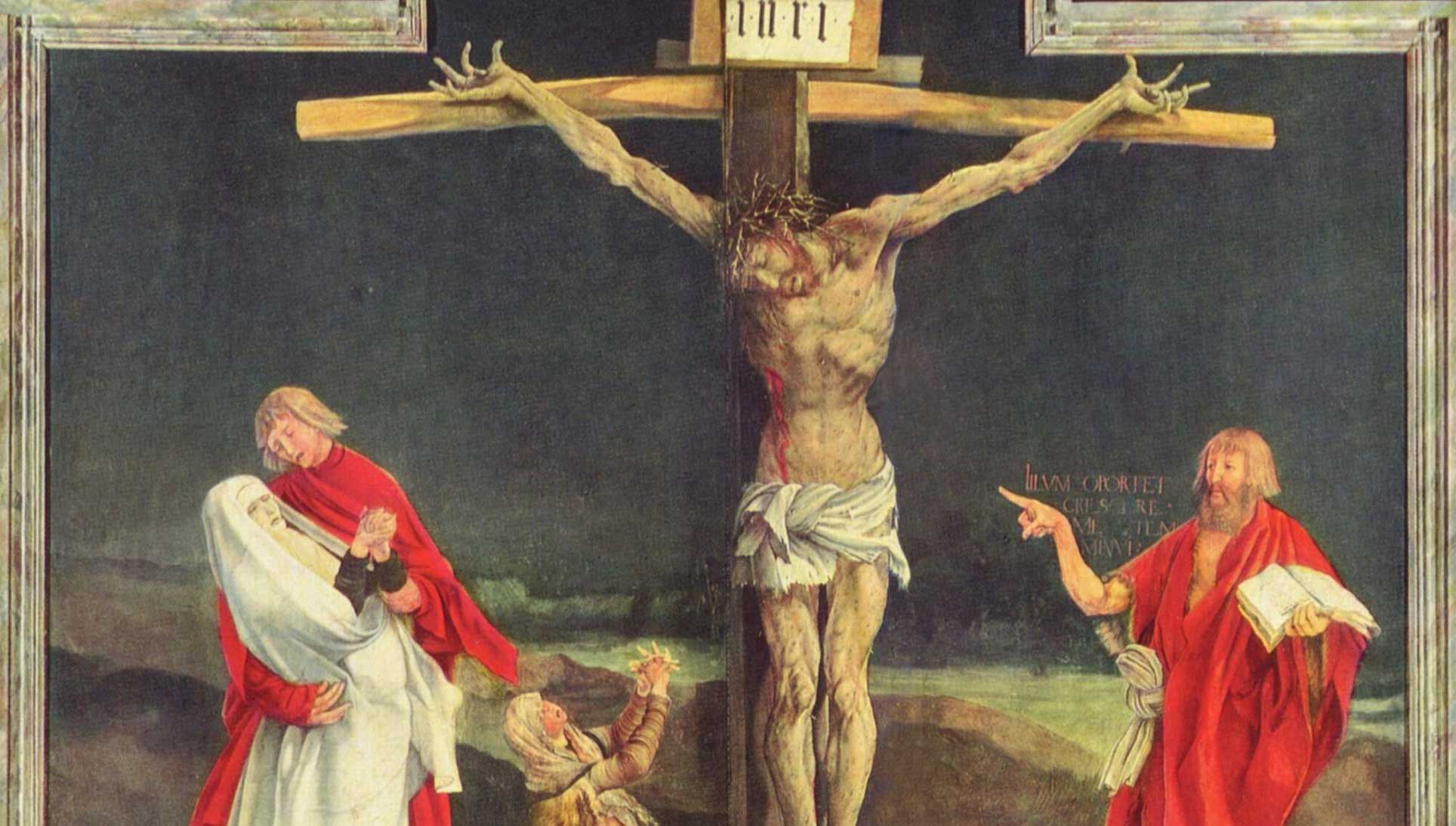View
The Constant Convert
James Bogle on the Life & Witness of the Late Stratford Caldecott
I first met Stratford Caldecott in the 1980s when he and his wife Léonie were living in Wimbledon not far from where my wife and I were living. He and Léonie had recently converted to the Catholic faith.
My first impression of Strat was his almost preternatural quietness; he was soft-spoken and clearly used to being reflective. This immediately made me curious about his background, and I was surprised to learn that he had not been baptized as a child. He received this sacrament only when he converted to Catholicism.
That intrigued me still more, and it was difficult to resist asking him what faith he had been brought up in. Happily, Strat was willing to tell his story, and he did so delightfully and intelligently. Soon my wife and I were also learning Léonie's story, which was every bit as fascinating and well told. We quickly realized that we were encountering a very remarkable couple with an almost unique tale to tell—one that spoke directly to the modern age, yet had the timeless, ageless quality of truth.
It was as if we had before us witnesses to testify to the world that even our godless, faithless, and insipid culture was not beyond salvation after all. For here were two children of that age and culture, who had yet come through it, turned it back the right way up, and brought it, in the persons of themselves, to salvation and fruition in the fullness of the faith. And we were not disappointed in our feeling that this was so—for indeed it was.
Mysticism & Science
Strat was brought up with no religious faith by two South African anti-apartheid intellectuals who had quit that country in 1951. The family lived in London, his father then being a publisher at Penguin Books. Strat developed a voracious appetite for books, as well as a strong interest in both mysticism and popular science. Tellingly, the two were not antonyms for him but were entirely inter-related. That made his insight all the more fitting to meet the challenges of the age of the scientific skeptic.
Strat had a climacteric insight at the age of fourteen, which set him upon the road to the discovery of the divine. Troubled by the tawdry insufficiency of the materialist claim that all is but matter and energy (whether "dark" or not), he realized, in an instant, that merely to be conscious of the question and aware of one's consciousness thereof was itself a complete rebuttal of the materialist claim. Self-awareness is, after all, a non-material quality.
How can mere matter know itself, unless there first be a non-material consciousness to do the actual knowing? A stone has no consciousness of itself, and while an animal perhaps partly does, clearly the consciousness that humans have of their being is of an entirely different level and order. That self-awareness bespeaks immaterial, metaphysical consciousness. And that, in turn, bespeaks a higher, originating metaphysical power. So Strat reasoned—and entirely consistently. At fourteen, he had realized what many a modern intellectual atheist has failed to realize.
With his increasing understanding of science, Strat was able to see that there must be an entity, a dimension, beyond space and time, which was also a unity or unified being. This, as Aquinas tells us in his Quinque Viae or "Five Ways," is what men call God. Simple, real, true. Thus, Strat, brought up without a scrap of religious faith, had, through the mysterious inter-weavings of nature, the human mind and spirit, and grace, arrived at God, at once rationally and yet also mystically.
A Meandering Path to Rome
But Christianity was still some way off. As he told us, he had not been much impressed by the lukewarm formality of public-school religion, which he received when a schoolboy at Dulwich College. He then went up to Oxford to read philosophy and psychology, and while he found his formal studies dry and jejune, he was soon immersed in a milieu of the exotic and the esoteric in his reading, while he lived in the cloistered haven of once-Christian, now largely heathen, Oxford. His father had been much taken by the alternative lifestyles and thought on offer in the 1960s, and Strat himself, after reading widely in many cultures and religions, introduced himself at about this time to the Baha'i faith.
It was also at Oxford that he met Léonie, and they fell in love and married while Strat was a member of the Baha'i faith. He later moved on to Sufism, the mystical element of the Muslim religion. Later, Buddhism attracted him, but upon coming under the influence of the Exeter philosopher Robert Bolton, who had converted to Roman Catholicism, Strat began moving to an altogether new level.
It was then that he returned to the stories he had read in childhood that had never left him—the Arthurian legends, the Quest of the Grail, the Narnia books of C. S. Lewis, and particularly Tolkien's Lord of the Rings. And so, he told us, the realization that his imagination had, in many ways, been built upon a Christian foundation crept, on tiptoe, into his consciousness. The path to Rome lay ahead, and eventually both he and Léonie took it. (Léonie's journey—from a loosely Anglican upbringing through eco-feminism and finally to the eternal faith—is equally compelling but deserves to be told all on its own.)
Rationality & Relationship
Now he was reading giants of Catholic thinking—Gilson, Maritain, and Aquinas—and the key turned softly in the lock, opening upon the treasure trove he had glimpsed in the stars and had been patiently, but inexorably, climbing towards.
Strat well described, in his quiet, soft-spoken, but nonetheless passionate way, the fiery exhilaration that comes with the discovery of truth whole and entire, without admixture. The feeling was instantly recognizable to me, as I had made a similar journey, though not by so fascinating and adventurous a route.
I had come to faith by reason. Unless someone could persuade me of the truth of the propositions I was to be expected to believe, I would not believe them (fortunately, someone did). Strat understood the same, but from the start of his journey, he also understood that faith is more yet—that it is also the beginning of a relationship, a relationship that requires self-giving. He quickly understood—and I could readily see that he had understood this much quicker than many another convert, myself included—that faith, although entirely logical and rational, required something higher still, that is, a relationship of trust with the Being that knows us better than we do ourselves.
His father, like my own, was not impressed with this new choice of religion. This, too, was a shared experience that I was grateful to be able to talk with Strat about.
By now, he told me, he was in America reading Newman, Chesterton, and Hans Urs von Balthasar. His devotion to Chesterton led him to become something of a world expert on him.
Teaching & Writing
After conversion, Strat became, not less, but more active—active in living and teaching the faith as a layman in the modern world. He appreciated, far better than many who claim to know, the incarnate nature of the Christian religion. It is a religion of the here and now—and of acting here and now—every bit as much as it is a religion of meditation, prayer, and mysticism. Indeed, it always seemed to me that the two went together in Strat in perfect harmony.
In the 1990s he and Léonie founded the Centre for Faith and Culture in Oxford, and in 2001 they founded the journal Second Spring. Strat also served on the editorial boards of The Chesterton Review, Communio, and Oasis, and taught at numerous colleges and universities.
His writing ranged widely over many subjects—Tolkien, Christopher Dawson, education, Distributism, liturgical reform, Catholic ecology and economics, and Christian apologetics and theology. He appeared regularly in journals such as Touchstone, This Rock, The Chesterton Review, The Imaginative Conservative, Parabola, The Tablet, the Catholic Herald, and the National Catholic Register. His books include The Seven Sacraments, All Things Made New, Beauty for Truth's Sake, and Beauty in the Word.
In 2010, he and Léonie began to edit the UK and Ireland edition of the monthly prayer booklet Magnificat, and Strat also edited Humanum, the online journal of the Centre for Cultural and Pastoral Research in Washington, D.C. He even found time to begin, in collaboration with the Tabah Foundation, a series of inter-faith colloquia for Christian and Islamic thinkers. Even after he was diagnosed with prostate cancer, he continued to write, publishing The Power of the Ring, The Radiance of Being, and Not As the World Gives. And fittingly, in 2013, he was awarded an honorary doctorate in Sacred Theology from the Pontifical John Paul II Institute at the Catholic University of America.
As a teacher and writer, he ranked with the best of our modern-day Catholic thinkers. Happily for the rest of us, God gave him some very remarkable intellectual and spiritual gifts.
Contemplative & Active
The testimony of his witness to the faith is his life. I could not put it better than did our mutual friend, Father Dwight Longenecker, the convert American priest, who recently wrote this of Strat:
He held a sure, constant and quiet faith, writing and living his faith consistently while, in many ways, being marginalized by the intellectual establishment and Catholic establishment in England. I don't think it is too unfair to observe that the English establishment do not like Catholics and the Catholic establishment do not like intellectuals. Strat, being a Catholic intellectual, remained an outsider. He was also an outsider in England because he was, like me, a foreigner. He didn't really fit in. He also didn't really fit into English Catholic circles because he actually did something. He didn't wait to be asked and didn't wait to be thanked. He organized international conferences. He started publishing houses, intellectual journals, and worked tirelessly editing, writing, encouraging writers and quietly building up an impressive and powerful body of work.
True, indeed!
Here was a mystically inclined thinker—poetic, influenced by dreams, sensitive, gentle, thoughtful, and perhaps tempted to the purely contemplative life—who was, nonetheless, supremely a man of action and active work: writing, publishing, editing, teaching, organizing, creating, starting and building a family; industrious, energetic, and engaged in the business of the world.
How sad, then, that he should be cut down in the prime of his creative life.
But God knows the time and the place for all of us, and when he deems that the work is crowned and complete, he takes us—often, as in Strat's case, still requiring from his elect a heroic struggle at the end. His will may be inscrutable to us now, but in the next life it will be clear enough.
With a beautiful and talented wife and three beautiful daughters (one now married and with a child of her own), a wealth of creative work, and many faithful friends, and having presented the faith in wonderfully creative and winning ways to so many, one can perhaps begin to understand that he was now fitted for the Elysian fields—for Tolkien's "white shores, and beyond, a far green country under a swift sunrise."
Farewell, dear Strat—from your many friends who remember you with great fondness and love. Requiescat in pace. •
Touchstone articles by Stratford Caldecott:
Speaking the Truths Only the Imagination May Grasp
An Essay on Myth & "Real Life"
The Lord & Lady of the Rings
The Hidden Presence of Tolkien's Catholicism in The Lord of the Rings
Supermen & Virtues
On the Appeal & Value of Superheroes
James Bogle is a writer, barrister, former soldier, and convert from Anglicanism, born in Australia but living in London. He is Vice-Chairman of the Catholic Union of Great Britain. He and his wife Joanna co-authored Heart for Europe, a biography of the last Habsburg Emperor, Blessed Charles I of Austria.
bulk subscriptions
Order Touchstone subscriptions in bulk and save $10 per sub! Each subscription includes 6 issues of Touchstone plus full online access to touchstonemag.com—including archives, videos, and pdf downloads of recent issues for only $29.95 each! Great for churches or study groups.
Transactions will be processed on a secure server.
more on conversion from the online archives
more from the online archives
calling all readers
Please Donate
"There are magazines worth reading but few worth saving . . . Touchstone is just such a magazine."
—Alice von Hildebrand
"Here we do not concede one square millimeter of territory to falsehood, folly, contemporary sentimentality, or fashion. We speak the truth, and let God be our judge. . . . Touchstone is the one committedly Christian conservative journal."
—Anthony Esolen, Touchstone senior editor











